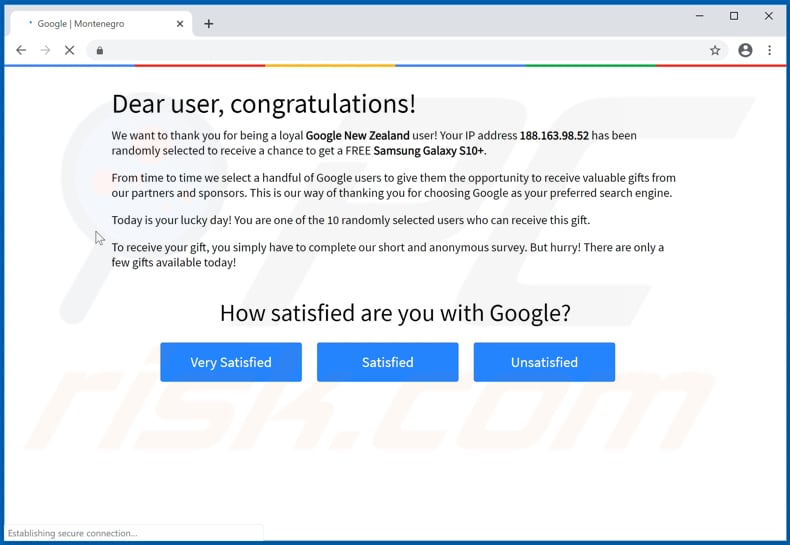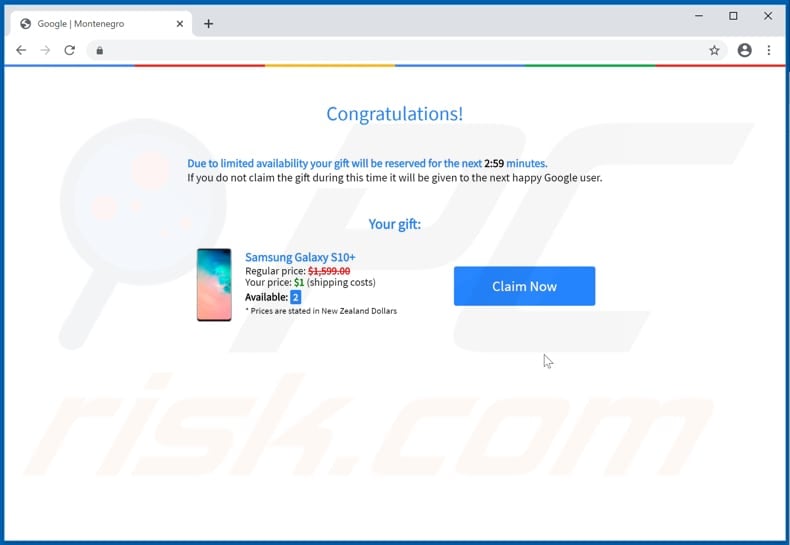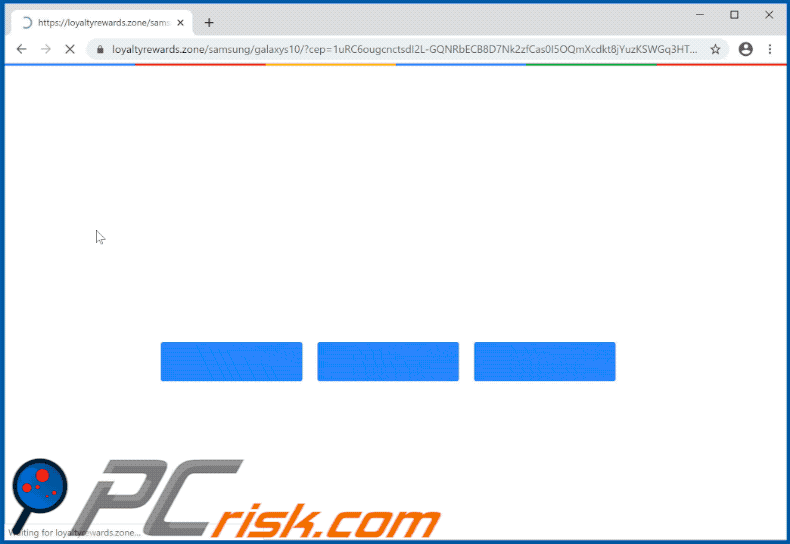Remove apps that open "Dear user, congratulations!" and other scam sites
Phishing/ScamAlso Known As: Dear user, congratulations! pop-up
Get free scan and check if your device is infected.
Remove it nowTo use full-featured product, you have to purchase a license for Combo Cleaner. Seven days free trial available. Combo Cleaner is owned and operated by RCS LT, the parent company of PCRisk.com.
What is "Dear user, congratulations!"?
"Dear user, congratulations!" is one of many scam websites used to trick visitors into believing that they have won a prize, can receive a gift, and so on. In this particular case, visitors are informed that they have won a mobile telephone and can claim it by completing a survey.
As with many other scams, however, this one attempts to deceive visitors into providing personal information. People are also asked to transfer a small sum of money. We strongly recommend that you ignore these websites and, more importantly, do not provide any information.

The main page of this scam states that ten visitors have the chance to receive a gift, a mobile telephone. At the time of research, this was the Samsung Galaxy S10+. To receive a gift, visitors must supposedly complete a survey - they must do this immediately, since the number of gifts is apparently limited.
After completing the survey, visitors are offered a gift for just one dollar - i.e., they simply pay for the shipping. This scam website also asks people to provide various information such as first and last name, email address, and other details. These web pages often ask for confidential information such as credit card details, and other sensitive information.
We strongly advise against providing any information on scam websites, or other untrusted sites. The scammers behind them misuse the details to generate revenue by making fraudulent purchases and transactions, stealing identities, and so on. This might cause unsuspecting visitors monetary loss, problems with privacy, browsing safety, and other serious issues.
Therefore, do not trust "Dear user, congratulations!" or any other scam websites.
Typically, people do not visit scam websites or other untrusted pages intentionally - they are opened through clicked deceptive ads, other dubious web pages or potentially unwanted applications (PUAs) installed on the system. Apps of this type usually feed users with ads and/or gather information.
They serve intrusive ads such as coupons, banners, surveys, pop-ups, etc. These redirect people who click them to various untrusted web pages. In some cases, they run scripts that download or install unwanted software. Furthermore, PUAs often track information.
They collect details relating to users' browsing habits such as IP addresses, entered search queries, addresses of visited pages, geolocations, and so on. They sometimes record personal, sensitive information as well. Developers misuse the data to generate revenue by selling it to third parties (potentially, cyber criminals) who misuse it in other ways.
| Name | Dear user, congratulations! pop-up |
| Threat Type | Phishing, Scam, Social Engineering, Fraud. |
| Fake Claim | According to this scam page, visitors can receive gifts by completing a survey. |
| Related Domains | loyaltyrewards[.]zone |
| Detection Names (loyaltyrewards[.]zone) | CRDF (Malicious), ESET (Suspicious), Fortinet (Spam), Full List Of Detections (VirusTotal) |
| Symptoms | Appearing fake lotteries, fake error messages, fake system warnings, pop-up errors, hoax computer scan. |
| Distribution methods | Compromised websites, rogue online pop-up ads, potentially unwanted applications. |
| Damage | Loss of sensitive private information, monetary loss, identity theft, possible malware infections. |
| Malware Removal (Windows) |
To eliminate possible malware infections, scan your computer with legitimate antivirus software. Our security researchers recommend using Combo Cleaner. Download Combo CleanerTo use full-featured product, you have to purchase a license for Combo Cleaner. 7 days free trial available. Combo Cleaner is owned and operated by RCS LT, the parent company of PCRisk.com. |
Some examples of other similar scam pages include "Dear YouTube user, Congratulations!", "Congratulations Walmart shopper!" and "Dear Chrome User, Congratulations!". Most of these websites attempt to deceive visitors into providing information so that they can supposedly receive a prize, gift, and so on.
People who trust these pages become victims of identity theft, lose money, and experience other problems. Browsers commonly open these web pages due to installed PUAs.
How did potentially unwanted applications install on my computer?
PUAs are usually downloaded/installed through the set-ups of other programs. I.e., when they are included into software set-ups and presented as additional offers. This PUA distribution method is called "bundling" and is used to trick people into downloading and installing unwanted software with other, regular software.
In most cases, offers to download/install additionally-included apps are mentioned in "Custom", "Advanced", and other settings of the set-ups. People who download or install programs without checking and changing these settings often allow PUAs to infiltrate.
In some cases, PUAs are downloaded/installed when people click deceptive ads that execute certain scripts. Many people download and install PUAs inadvertently.
How to avoid installation of potentially unwanted applications
Download all programs and files from official websites and via direct links. Other sources and tools such as third party downloaders/installers, torrent clients, eMule (and other Peer-to-Peer networks), unofficial websites should not be trusted - they are often used to promote various unwanted, potentially malicious apps.
Check "Advanced", "Custom" and other similar settings of the download and installation setups. Dismiss any offers to download or install additionally-included (unwanted) apps before completing the process. Intrusive ads that are displayed on dubious web pages often open untrusted websites or cause download/installation of unwanted applications.
Therefore, do not click them. Remove any unknown, unwanted/suspicious extensions, plug-ins and add-ons installed on the browser, and programs of this kind installed on the operating system. If your computer is already infected with PUAs, we recommend running a scan with Combo Cleaner Antivirus for Windows to automatically eliminate them.
Text presented on the "Dear user, congratulations!" main web page:
Dear user, congratulations!
We want to thank you for being a loyal Google United States user! Your IP address 45.56.174.169 has been randomly selected to receive a chance to get a FREE Samsung Galaxy S10+.From time to time we select a handful of Google users to give them the opportunity to receive valuable gifts from our partners and sponsors. This is our way of thanking you for choosing Google as your preferred search engine.
Today is your lucky day! You are one of the 10 randomly selected users who can receive this gift.
To receive your gift, you simply have to complete our short and anonymous survey. But hurry! There are only a few gifts available today!
Questions:How satisfied are you with Google?
Very Satisfied Satisfied Unsatisfied
Would you recommend Google?
Yes No Maybe
What do you like the most about Google?
Speed Service Privacy
Screenshot of the second page of the "Dear user, congratulations!" scam:

Text on this page:
Congratulations!
Due to limited availability your gift will be reserved for the next 2:57 minutes.If you do not claim the gift during this time it will be given to the next happy Google user.
Your gift:
Samsung Galaxy S10+Regular price: $1,599.00
Your price: $1 (shipping costs)
Available: 2
* Prices are stated in New Zealand Dollars
Claim Now
The appearance of the "Dear user, congratulations!" pop-up (GIF):

Instant automatic malware removal:
Manual threat removal might be a lengthy and complicated process that requires advanced IT skills. Combo Cleaner is a professional automatic malware removal tool that is recommended to get rid of malware. Download it by clicking the button below:
DOWNLOAD Combo CleanerBy downloading any software listed on this website you agree to our Privacy Policy and Terms of Use. To use full-featured product, you have to purchase a license for Combo Cleaner. 7 days free trial available. Combo Cleaner is owned and operated by RCS LT, the parent company of PCRisk.com.
Quick menu:
- What is Dear user, congratulations! pop-up?
- How to identify a pop-up scam?
- How do pop-up scams work?
- How to remove fake pop-ups?
- How to prevent fake pop-ups?
- What to do if you fell for a pop-up scam?
How to identify a pop-up scam?
Pop-up windows with various fake messages are a common type of lures cybercriminals use. They collect sensitive personal data, trick Internet users into calling fake tech support numbers, subscribe to useless online services, invest in shady cryptocurrency schemes, etc.
While in the majority of cases these pop-ups don't infect users' devices with malware, they can cause direct monetary loss or could result in identity theft.
Cybercriminals strive to create their rogue pop-up windows to look trustworthy, however, scams typically have the following characteristics:
- Spelling mistakes and non-professional images - Closely inspect the information displayed in a pop-up. Spelling mistakes and unprofessional images could be a sign of a scam.
- Sense of urgency - Countdown timer with a couple of minutes on it, asking you to enter your personal information or subscribe to some online service.
- Statements that you won something - If you haven't participated in a lottery, online competition, etc., and you see a pop-up window stating that you won.
- Computer or mobile device scan - A pop-up window that scans your device and informs of detected issues - is undoubtedly a scam; webpages cannot perform such actions.
- Exclusivity - Pop-up windows stating that only you are given secret access to a financial scheme that can quickly make you rich.
Example of a pop-up scam:

How do pop-up scams work?
Cybercriminals and deceptive marketers usually use various advertising networks, search engine poisoning techniques, and shady websites to generate traffic to their pop-ups. Users land on their online lures after clicking on fake download buttons, using a torrent website, or simply clicking on an Internet search engine result.
Based on users' location and device information, they are presented with a scam pop-up. Lures presented in such pop-ups range from get-rich-quick schemes to fake virus scans.
How to remove fake pop-ups?
In most cases, pop-up scams do not infect users' devices with malware. If you encountered a scam pop-up, simply closing it should be enough. In some cases scam, pop-ups may be hard to close; in such cases - close your Internet browser and restart it.
In extremely rare cases, you might need to reset your Internet browser. For this, use our instructions explaining how to reset Internet browser settings.
How to prevent fake pop-ups?
To prevent seeing pop-up scams, you should visit only reputable websites. Torrent, Crack, free online movie streaming, YouTube video download, and other websites of similar reputation commonly redirect Internet users to pop-up scams.
To minimize the risk of encountering pop-up scams, you should keep your Internet browsers up-to-date and use reputable anti-malware application. For this purpose, we recommend Combo Cleaner Antivirus for Windows.
What to do if you fell for a pop-up scam?
This depends on the type of scam that you fell for. Most commonly, pop-up scams try to trick users into sending money, giving away personal information, or giving access to one's device.
- If you sent money to scammers: You should contact your financial institution and explain that you were scammed. If informed promptly, there's a chance to get your money back.
- If you gave away your personal information: You should change your passwords and enable two-factor authentication in all online services that you use. Visit Federal Trade Commission to report identity theft and get personalized recovery steps.
- If you let scammers connect to your device: You should scan your computer with reputable anti-malware (we recommend Combo Cleaner Antivirus for Windows) - cyber criminals could have planted trojans, keyloggers, and other malware, don't use your computer until removing possible threats.
- Help other Internet users: report Internet scams to Federal Trade Commission.
Share:

Tomas Meskauskas
Expert security researcher, professional malware analyst
I am passionate about computer security and technology. I have an experience of over 10 years working in various companies related to computer technical issue solving and Internet security. I have been working as an author and editor for pcrisk.com since 2010. Follow me on Twitter and LinkedIn to stay informed about the latest online security threats.
PCrisk security portal is brought by a company RCS LT.
Joined forces of security researchers help educate computer users about the latest online security threats. More information about the company RCS LT.
Our malware removal guides are free. However, if you want to support us you can send us a donation.
DonatePCrisk security portal is brought by a company RCS LT.
Joined forces of security researchers help educate computer users about the latest online security threats. More information about the company RCS LT.
Our malware removal guides are free. However, if you want to support us you can send us a donation.
Donate
▼ Show Discussion